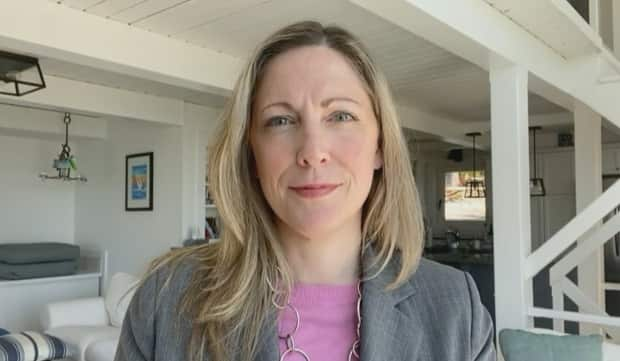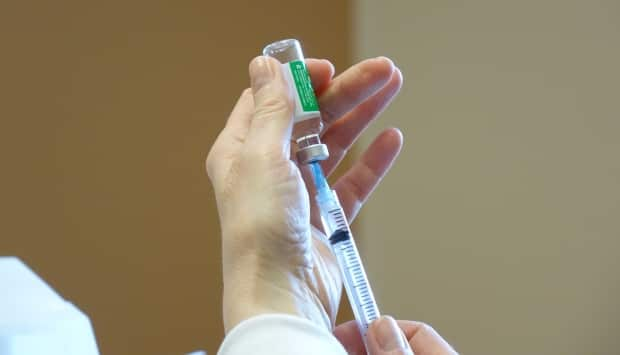An infectious disease specialist answers your COVID-19 vaccination questions


The COVID-19 vaccine situation in North America seems to be changing by the day. The United States recently recommended the suspending the use of Johnson & Johnson vaccine to investigate blood clots experienced by a handful of people after receiving the inoculation, while public health officials in Newfoundland and Labrador recently stopped vaccinating people under 55 with the AstraZeneca-Oxford vaccine until more is known about the risk — but that was before Sunday, when the federal government announced provinces are free to expand eligibility to any adult over the age of 18.
We know you may have questions, and we hope to give you answers. The CBC's Peter Cowan spoke with Dr. Lisa Barrett, an infectious disease researcher and clinician at Halifax's Dalhousie University, asking vaccine questions sent in by Here & Now viewers.
The following conversation has been edited for length and clarity.
Q: A lot of people have questions about the AstraZeneca-Oxford vaccine. Right now it's only being used for people aged 55-64. What makes the vaccine safe for that age group?
A: The information that came out from the European areas that have been using a lot of AstraZeneca in the early parts of their vaccine rollout found very rare, and I mean very rare, maybe one in a million people.… Between 18 and say 46 or 48, there was a risk of a very rare kind of immune-related blood clot that could happen. Because of that risk, albeit very, very low, there was a further investigation that did lead to the European group saying, "This may be related to the vaccine. However, it's still very safe."
The reason that people above the age of … 55 are still eligible to get it, in particular in Canada, is because of two things. No. 1, the risk is very low and the incidents were found almost exclusively under the age of 65.… No. 2, and very importantly, your risk of getting COVID and having a very bad outcome like hospitalization and death are far higher if you're above 55 than they are of getting a blood clot and having a similarly bad impact. Because of those reasons, it was decided that the benefit of the vaccine far exceeded, at least to our knowledge at the moment, the risk.… This was very much based on information data and risk benefit.
Q: How does this compare to other risk factors for blood clots?
A: Your risk factor for a blood clot as a general Canadian may be somewhere around a thousand in a million as compared with one in a million or one in 250,000. Four in a million. So still lower than your regular risk of what we call a deep-vein blood clot in a big vessel like the vein or the arm or within the lung.
They are still very rare, as everyone knows. Most of us walk around all of our lives without ever getting a blood clot in our lung or our leg. But that's still around a thousand in a million versus four in a million, which is probably around the rate that we're thinking might exist for this particular rare type of blood clot with AstraZeneca. So to be clear, the risk is very low compared to your usual risk even of getting blood clots. It really goes back to what your risk is of running into COVID."

Q: If officials are telling us about the risk so we can make an informed decision, why can't people under 55 decide they want to take the risk of AstraZeneca? Can we only make some informed decisions related to our health?
A: It kind of comes into this realm of public health. I mean, we're all told, whether we like it or not, that we're going to wear a helmet on a bicycle. We're going to wear a seatbelt in a car. Those are things where we get told a little bit what's good for us. The difference with this particular situation right now, that makes it a little bit of a pause for the people making the rules, if you will … is that if we give people the choice, they also have the responsibility of making sure there's a reasonable option for people to have a different vaccine if they say yes or no. But also, a reasonable chance that they're going to get all the right information at the right time.
That means there has to be enough providers out there who know about this, who can help them assess their risk of both COVID and blood clots.… This is a pause, not a "you're never ever gonna be able to take it," while we gather up a little bit more information to add a little bit more knowledge and then put it out to people.
Q: Should I avoid getting the AstraZeneca vaccine if I've had a blood clot in the last year or a genetic predisposition to a blood clot? Does that change the risk equation for people?
A: That is an answer that is somewhat evolving at the moment. For the most part, those "usual-type clots," we call them, provoked blood clots.… In general that's a very different mechanism than this specific mechanism associated with the AstraZeneca vaccine, and it is unlikely that the two overlap.
However, some people may not be comfortable if they've had a blood clot in the past for various reasons just like people are uncomfortable about many things when they're making health decisions. It is worth a conversation with your health provider, and also keeping an eye on the information as we go forward. But right now, they are very separate mechanisms for causing blood clots.
Q: With more and more people being vaccinated Canada-wide, why are we seeing such a spike in cases? Shouldn't it be going the other way?
A: The answer to this one is that we don't have enough people vaccinated yet to prevent that chain of transmission, especially without symptoms, for one person another in densely populated areas in particular in order for it to make a difference. You have to vaccinate enough people to break the chain of transmission, especially when people don't know they're infected in densely populated areas, before we're really going to see the case numbers go down. So hold on to our horses a little bit. it's going to take a couple of months for sure, and maybe a few months before we see the full effects.
Q: What does N.L. society look like as we near 100 per cent of the population getting our first shot?
A: We do want as many people as we can vaccinated, but does that mean we get back to immediately normal?… We do need to be careful, I think, as we open things up, and I would love to see that happen in stages. Every couple of months we see a little bit more restrictions go away after everyone is fully vaccinated.
If I were a betting person, it's going to take the better part of a year. Let's hope we keep all those variants under control and that doesn't set our timeline.

